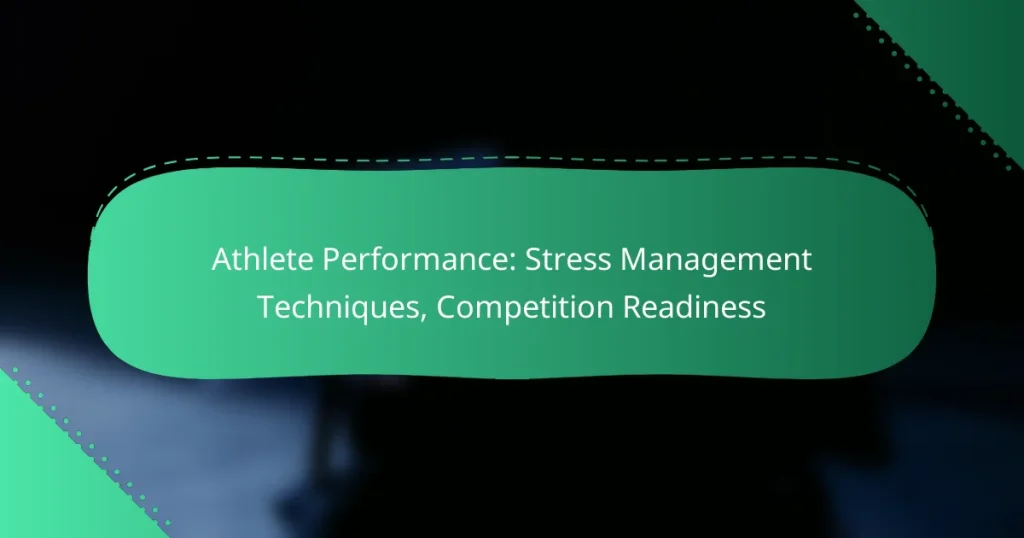Effective stress management techniques are essential for athletes, as they help reduce anxiety and enhance focus, leading to improved performance. By integrating these practices into their daily routines, athletes can build mental resilience and prepare themselves for competition readiness, which encompasses structured training, proper nutrition, and adequate rest. This holistic approach not only primes athletes physically but also fortifies their mental strength, enabling them to cope with the pressures of competition.

What Are Effective Stress Management Techniques for Athletes?
Effective stress management techniques for athletes involve practices that help reduce anxiety and enhance focus, ultimately improving performance. These techniques can be integrated into daily routines to promote mental resilience and readiness for competition.
Mindfulness Meditation
Mindfulness meditation helps athletes stay present and focused, reducing stress and anxiety. By dedicating just a few minutes daily to this practice, athletes can enhance their concentration and emotional regulation.
To practice mindfulness, find a quiet space, sit comfortably, and focus on your breath. If your mind wanders, gently bring your attention back to your breathing. Regular practice can lead to improved mental clarity during competitions.
Breathing Exercises
Breathing exercises are effective for managing stress and promoting relaxation. Techniques such as deep diaphragmatic breathing can lower heart rates and reduce tension before competitions.
For a simple exercise, inhale deeply through your nose for a count of four, hold for four, and exhale through your mouth for a count of six. Repeat this cycle several times to help calm your mind and body.
Progressive Muscle Relaxation
Progressive muscle relaxation (PMR) involves tensing and relaxing different muscle groups to alleviate physical tension and stress. This technique can be particularly beneficial before competitions to enhance physical readiness.
To practice PMR, start at your toes and work your way up to your head, tensing each muscle group for a few seconds before relaxing. This method can help athletes become more aware of their body and release built-up tension.
Yoga and Stretching
Yoga and stretching not only improve flexibility but also promote relaxation and mental clarity. Incorporating these practices into an athlete’s routine can help manage stress and prepare the body for physical exertion.
Consider a short yoga session focusing on breath and movement, or a series of stretches targeting major muscle groups. Aim for at least 15-30 minutes a few times a week to reap the benefits.
Visualization Techniques
Visualization techniques involve mentally rehearsing performance scenarios to enhance confidence and reduce anxiety. Athletes can use this method to prepare for competitions by imagining successful outcomes.
To practice visualization, find a quiet space, close your eyes, and vividly imagine yourself succeeding in your sport. Focus on the details, including the environment, feelings, and sounds. Regular visualization can help reinforce a positive mindset and improve performance under pressure.
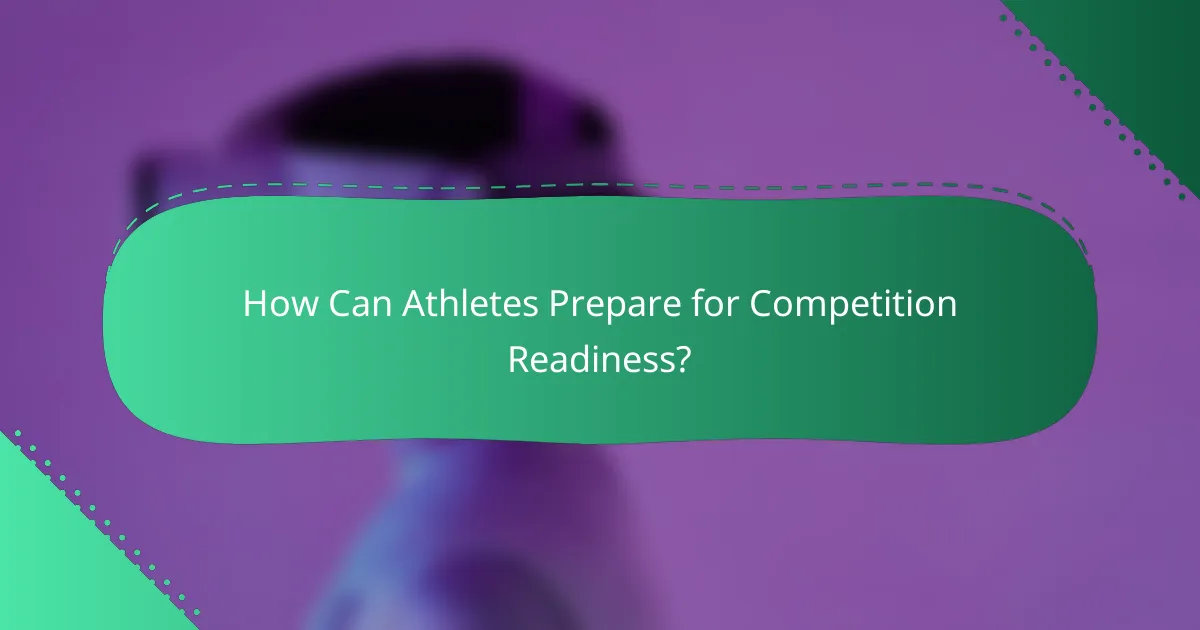
How Can Athletes Prepare for Competition Readiness?
Athletes can prepare for competition readiness by implementing a comprehensive approach that includes structured training, proper nutrition, adequate rest, and mental conditioning. These elements work together to enhance performance and ensure athletes are physically and mentally primed for competition.
Structured Training Plans
Structured training plans are essential for athletes to build strength, endurance, and skill specific to their sport. These plans should include a mix of aerobic and anaerobic exercises, strength training, and sport-specific drills tailored to the athlete’s needs and competition schedule.
It is important to gradually increase training intensity and volume to avoid injury and burnout. A common approach is to follow a periodization model, which cycles through phases of training focusing on different aspects such as endurance, strength, and peak performance.
Nutrition and Hydration Strategies
Nutrition and hydration are critical for optimal athletic performance. Athletes should focus on a balanced diet rich in carbohydrates, proteins, and healthy fats, ensuring they consume adequate calories to meet their energy demands. Timing meals around training sessions can enhance recovery and performance.
Hydration is equally important; athletes should drink fluids before, during, and after exercise. A general guideline is to consume at least 500-700 mL of water or electrolyte drinks in the hours leading up to competition, adjusting based on individual sweat rates and environmental conditions.
Rest and Recovery Protocols
Rest and recovery are vital components of an athlete’s training regimen. Adequate sleep, typically 7-9 hours per night, is essential for physical recovery and cognitive function. Incorporating rest days into training schedules helps prevent overtraining and injuries.
Active recovery techniques, such as light stretching, yoga, or low-intensity activities, can promote blood flow and reduce muscle soreness. Additionally, practices like foam rolling and massage therapy can aid in muscle recovery and flexibility.
Mental Conditioning Practices
Mental conditioning practices help athletes develop focus, resilience, and confidence. Techniques such as visualization, goal-setting, and mindfulness can enhance mental toughness and prepare athletes for the pressures of competition.
Regularly practicing mental skills training can improve performance under stress. Athletes should consider working with a sports psychologist or coach to tailor mental conditioning strategies to their specific needs and challenges.
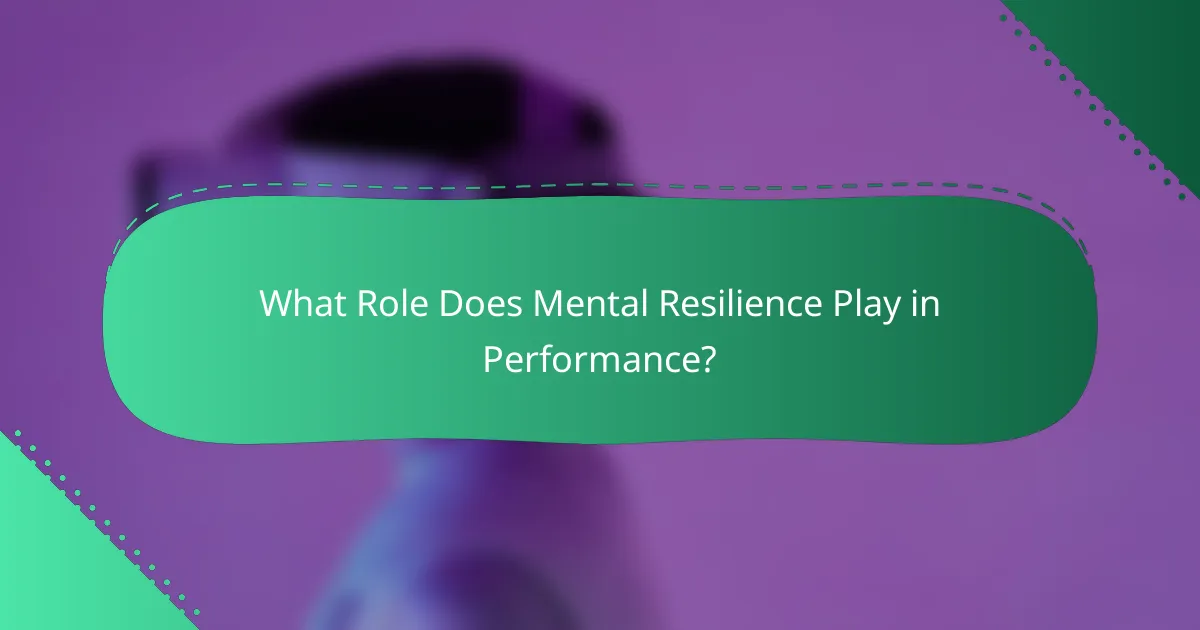
What Role Does Mental Resilience Play in Performance?
Mental resilience is crucial for athletes as it enables them to cope with stress, setbacks, and pressure during competitions. This psychological strength helps maintain focus and confidence, ultimately enhancing overall performance.
Building Confidence through Experience
Confidence in an athlete often stems from previous experiences, including training and competition. Engaging in regular practice and participating in various competitive scenarios can bolster self-belief. Athletes should seek opportunities to challenge themselves, gradually increasing the difficulty to build a solid foundation of confidence.
For example, an athlete might start by competing in local events before progressing to national competitions. This gradual exposure allows them to adapt and grow, reinforcing their confidence as they achieve small victories.
Adapting to Adversity
Adversity is an inevitable part of sports, and mental resilience equips athletes to handle challenges effectively. Developing a positive mindset can help athletes view setbacks as learning opportunities rather than failures. Techniques such as visualization and positive self-talk can aid in maintaining composure during tough situations.
For instance, an athlete who faces an injury might focus on rehabilitation and set new performance goals rather than dwelling on the setback. This adaptability can lead to greater long-term success and a stronger mental game.
Goal Setting and Focus
Setting clear, achievable goals is essential for maintaining focus and motivation. Athletes should establish both short-term and long-term objectives that are specific, measurable, and time-bound. This structured approach helps athletes stay on track and measure their progress effectively.
For example, a swimmer might set a goal to improve their time by a few seconds over the next month. Breaking down larger goals into smaller milestones can enhance focus and provide a sense of accomplishment along the way, reinforcing mental resilience.
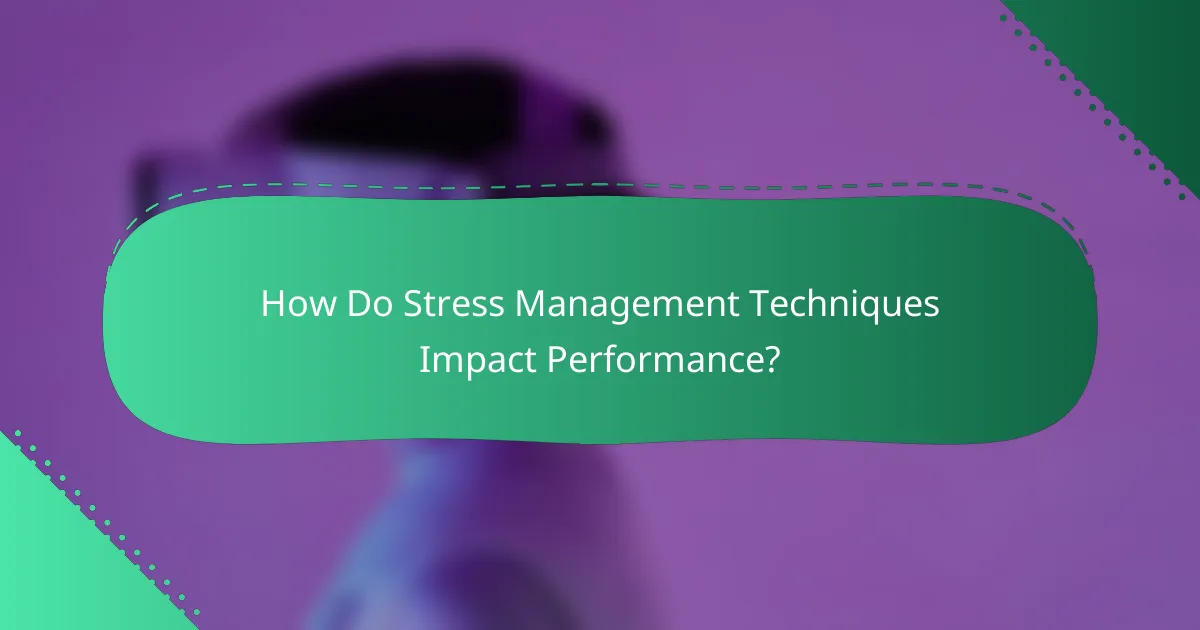
How Do Stress Management Techniques Impact Performance?
Stress management techniques significantly enhance athletic performance by improving focus, facilitating recovery, and reducing anxiety. These methods help athletes maintain optimal mental and physical states, which are crucial for peak performance during competitions.
Improved Focus and Concentration
Effective stress management techniques, such as mindfulness and visualization, can lead to improved focus and concentration. By reducing distractions and enhancing mental clarity, athletes can better execute their strategies and maintain their performance levels throughout competitions.
Practicing techniques like deep breathing or meditation can help athletes center their thoughts, allowing them to stay present and engaged. Regular use of these methods can result in a noticeable increase in attention span and decision-making speed during high-pressure situations.
Enhanced Recovery Rates
Stress management plays a vital role in enhancing recovery rates for athletes. Techniques such as progressive muscle relaxation and adequate sleep hygiene can significantly reduce physical tension and promote faster healing after intense training or competition.
Incorporating stress-relief practices into a training regimen can lead to improved muscle recovery times, allowing athletes to train more effectively and consistently. For instance, athletes who prioritize relaxation techniques may experience recovery times that are noticeably shorter, enabling them to return to peak performance quicker.
Reduced Anxiety Levels
Implementing stress management techniques can lead to reduced anxiety levels, which is crucial for athletes facing competitive pressures. Methods like cognitive behavioral therapy (CBT) and breathing exercises can help athletes cope with pre-competition nerves and maintain composure during events.
By actively managing anxiety, athletes can improve their overall mental health and performance outcomes. For example, those who regularly practice anxiety-reducing techniques may find themselves more relaxed and confident, leading to better results in competitions.
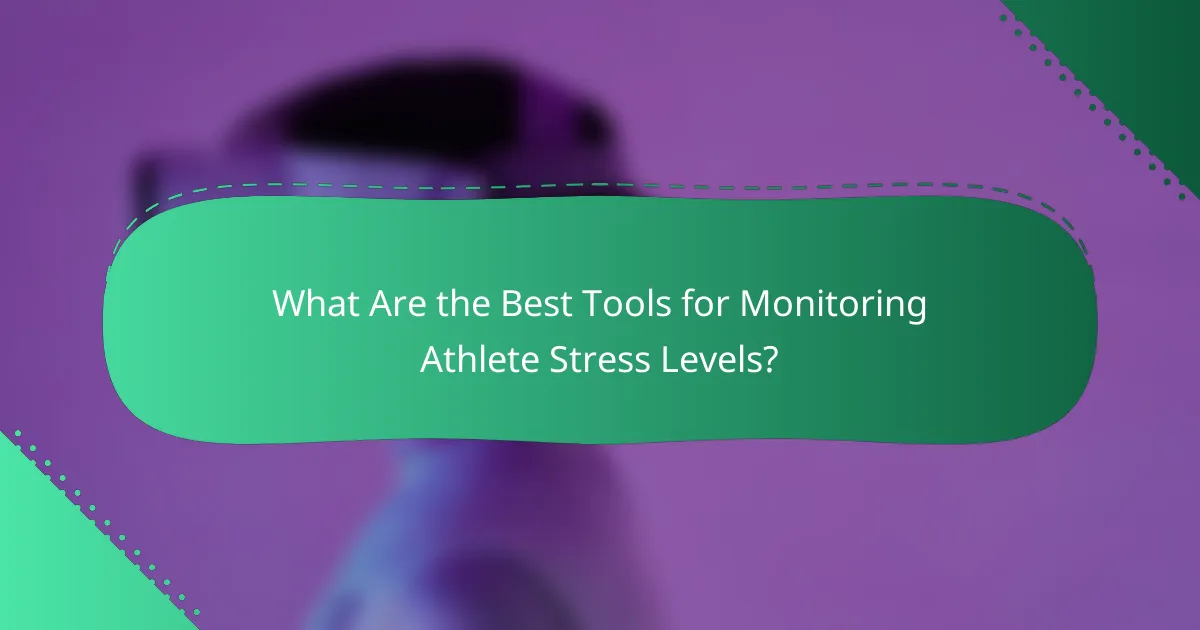
What Are the Best Tools for Monitoring Athlete Stress Levels?
Effective tools for monitoring athlete stress levels include wearable fitness trackers, heart rate monitors, and mobile apps designed for mental wellness. These tools help athletes gauge their stress responses and adjust their training or recovery strategies accordingly.
Wearable Fitness Trackers
Wearable fitness trackers are popular devices that monitor various physiological metrics such as heart rate, sleep patterns, and activity levels. By analyzing these metrics, athletes can identify stress levels and fatigue, allowing for timely adjustments to their training regimens.
When selecting a fitness tracker, consider features like heart rate variability (HRV) monitoring, which can provide insights into stress and recovery. Look for devices that offer long battery life and compatibility with other health apps for comprehensive data analysis.
Common pitfalls include relying solely on one metric for stress assessment. Instead, use a combination of data points, such as sleep quality and daily activity levels, to get a more accurate picture of overall stress and readiness for competition.
